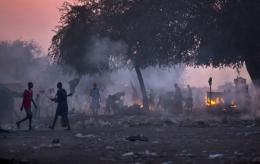
Editor's Note: This op-ed authored by John Prendergast and Justine Fleischner originally appeared in The Daily Beast.
On the dusty roads of Bentiu, the capital of South Sudan’s oil-rich Unity state, piles of dead bodies pulled from a local hospital, church and mosque lay baking in the hot sun. Last week, opposition forces loyal to former Vice President Riek Machar recaptured the strategic town. His undisciplined force—made up of defected ethnic Nuer soldiers and Nuer tribal militias, often referred to as White Army—quickly sought revenge for previous ethnically motivated attacks against Nuer by government forces.
In a move reminiscent of the Rwandan genocide, some of the opposition leaders took control of the local FM radio station and broadcast hate speech, encouraging the targeting of men, women, and children based on their ethnicity. The death toll is believed to be over 400. United Nations reports suggest that FM radio also was used to encourage young men to rape women from other ethnic groups.
Mass atrocities occurred last week in government-held areas as well. In Bor, the state capital of Jonglei, 200 armed men in civilian clothing stormed the U.N. base where over 5,000 civilians —mostly Nuer women and children—had sought refuge. The U.N. peacekeeping battalion of Indian soldiers fired warning shots, but failed to halt the angry mob. Over 50 civilians were killed and 100 injured.
Although the attackers in Jonglei were dressed in civilian clothing it is unlikely, as some reports suggested, that this was just a peaceful protest by government supporters who were provoked when the Nuer in the camp celebrated the rebel victory in Bentiu.
In response, the Ugandan People’s Defense Force (UPDF), which intervened at the outset of the war on the side of the government, has set up a perimeter around the U.N. base in Jonglei to prevent any further attacks. The UPDF has stepped up where the Government of South Sudan has failed to protect civilians.
Revenge has been a primary motivation for the targeting of civilians. What began as a political dispute between the president of South Sudan, Salva Kiir, a Dinka, and his former deputy, Riek Machar, a Nuer, has become a devastating civil war.
Last July, Kiir dismissed his entire cabinet, including Machar, in a power struggle within the ruling Sudan People’s Liberation Movement (SPLM). In November, Kiir dissolved all internal party structures, setting the two men on a collision course. On December 15, a dispute between rival factions within the elite Presidential Guard set off a wave of violence across Juba that quickly split along ethnic lines. Nuer were targeted and killed by Dinka soldiers in Juba and Machar’s house was leveled by government tanks. Nuer militia quickly mobilized to take revenge on the Dinka for the killings in Juba, and both sides subsequently have perpetrated horrible massacres.
Both China and the United States, the two most influential countries in South Sudan, have an interest in an end to the conflict. Khartoum seems particularly eager to see which side gets the upper hand and will likely do whatever is necessary to maintain its important stake in the pipelines carrying South Sudanese oil to Port Sudan on the Red Sea.
Continue reading this op-ed on The Daily Beast website.

